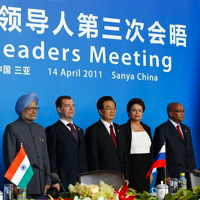Representing around 40 percent of the world's population and nearly a quarter of its economic output, Brazil, Russia, India, China and South Africa -- the so-called BRICS countries -- came together last week for a leaders summit to show off their growing global heft. The joint statement produced by the one-day meeting on China's southern resort island of Hainan underscored the need for a realignment of the post-World War II global order based on the untrammelled supremacy of the U.S.
The governing structure of international financial institutions, the statement said, "should reflect the changes in the world economy, increasing the voice and representation of emerging economies and developing countries." This was in line with the rising economic powers' longstanding demand that the global financial architecture be restructured to make it more representative. Though China's resistance kept the group from explicitly supporting India and Brazil's bids for permanent membership on the United Nations Security Council, the statement also calls for "comprehensive reform" of the U.N. to make the body "more effective, efficient and representative."
Among the more specific actions and recommendations announced were an agreement for development banks in BRICS countries to open mutual credit lines denominated in local currencies; a warning over the potential for "massive" capital inflows from developed nations to destabilize emerging economies; and support for "a broad-based international reserve currency system providing stability and certainty." There was also an implicit challenge posed to the status of the U.S. dollar as the leading global reserve currency.

